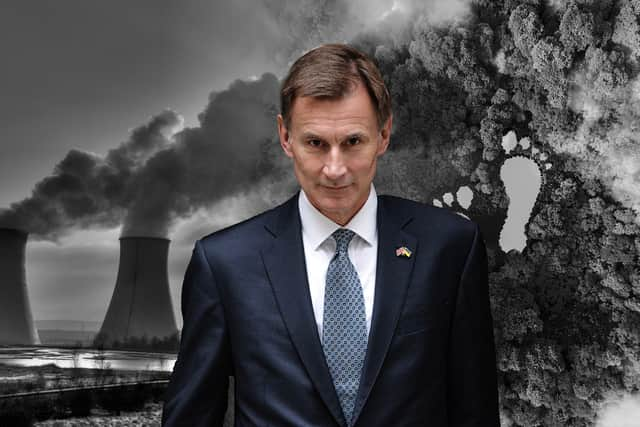Jeremy Hunt’s £20bn funding to cut UK carbon emissions slammed as money could be ‘better spent’
and live on Freeview channel 276
Jeremy Hunt is set to announce a £20 billion funding project over the next two decades to invest in technology to cut Britain’s carbon emissions.
The Treasury said the chancellor is set to announce the “unprecedented investment” into carbon capture and low carbon energy projects at next week’s budget on Wednesday (22 March).
Advertisement
Hide AdAdvertisement
Hide AdIt added that he will “commit to spades in the ground on these projects from next year”.
The investment will aim to create thousands of jobs, and Hunt is set to announce a “reset” of government efforts to clean up the UK’s domestic energy supply and safeguard energy security.
However, Friends of the Earth’s head of policy, Mike Childs, told NationalWorld the money would be “better spent insulating the homes of those living in fuel poverty and properly backing the production of green hydrogen.”
The government plans to add urgency to Britain’s nuclear programme, with a competition to develop small modular nuclear reactors (SMRs).
Advertisement
Hide AdAdvertisement
Hide AdThe plans come after both Hunt and the energy secretary, Grant Shapps, have been under pressure to respond to Biden’s $369 billion (£306 billion) of climate subsidies which have attracted a wave of green investment to the US and away from other countries including the UK.


The move will come as a relief to developers of carbon capture projects which have been awaiting government approval.
Carbon capture projects include the Acorn CCS project designed to support the decarbonisation of two St Fergus gas terminals in Aberdeenshire, and Viking CCS, a 34-mile pipeline that will take carbon from industrial sites on Humberside and lock it under the North Sea.
Carbon capture and storage is the process of capturing carbon dioxide emissions from industrial activity such as steel and cement production, transporting it, and then locking it into underground storage sites.
Advertisement
Hide AdAdvertisement
Hide AdThe government hopes to store 20 to 30 million tonnes of CO2 a year by 2030 and has set a legal target to reach net zero carbon emissions by 2050.
‘Carbon capture and storage is now less critical than it once was’
Mr Childs told NationalWorld: “With industries such as steel increasingly viewing hydrogen as the energy source of the future, instead of fossil fuels, the development of carbon capture and storage is now less critical than it once was.”
He added: “Unfortunately, CCS is starting to look like a technology aimed at prolonging the life of the fossil fuel industry - funded by the taxpayer and higher bills. This money would be far better spent insulating the homes of those living in fuel poverty and properly backing the production of green hydrogen made from the UK’s huge renewable energy resources.”
The government’s attempts to build the new UK nuclear power capacity has been set back by a series of delays and overruns to the construction of new plants at Hinkley Point C in Somerset. There has also been a lengthy process in finding funding for the proposed Sizewell C power station in Suffolk.
Advertisement
Hide AdAdvertisement
Hide AdOn Friday (10 March) the government said that Great British Nuclear, its newly formed delivery vehicle for nuclear projects, would run a competition to develop SMRs. It is investing £210 million into the Rolls-Royce SMR project.
Hunt said: “It’s time for a clean energy reset. That is why we are fully committing to nuclear power in the UK, backing a new generation of small modular reactors, and investing tens of billions in clean energy through carbon capture.”
The energy security secretary, Grant Shapps, said: “Already a global leader in offshore wind power, we now want to do the same for the UK’s nuclear and carbon capture industries, which in turn will help cut the wholesale electricity prices to among the lowest in Europe.”
Comment Guidelines
National World encourages reader discussion on our stories. User feedback, insights and back-and-forth exchanges add a rich layer of context to reporting. Please review our Community Guidelines before commenting.
